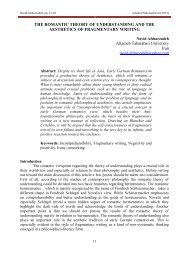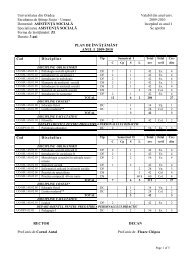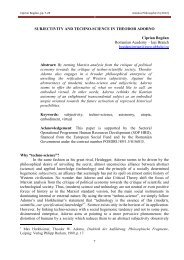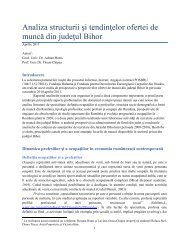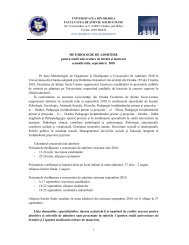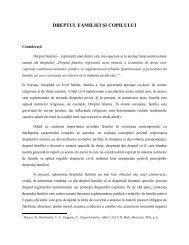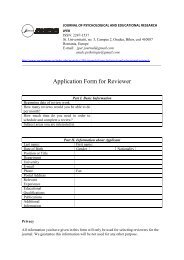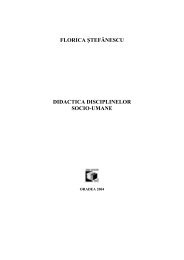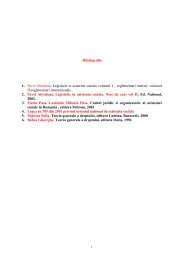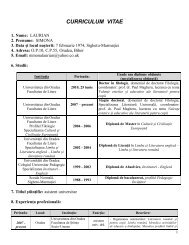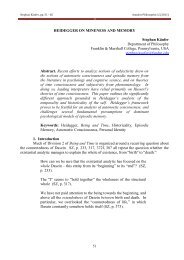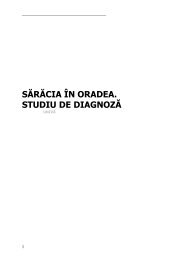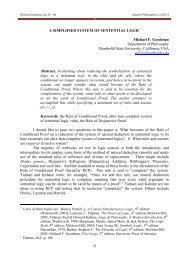ARISTOTLE'S ACCOUNT OF AKRASIA. TOWARDS A ...
ARISTOTLE'S ACCOUNT OF AKRASIA. TOWARDS A ...
ARISTOTLE'S ACCOUNT OF AKRASIA. TOWARDS A ...
You also want an ePaper? Increase the reach of your titles
YUMPU automatically turns print PDFs into web optimized ePapers that Google loves.
Annales Philosophici 5 (2012) Radu Uszkai, pp. 85-90<br />
some epistemic condition, concerning a particular premise, which precludes akratic action" 9 .<br />
Furthermore, following the footsteps of Amelie Rorty, we might say that some sort of desire<br />
represents the source of this epistemic condition which precludes incontinent acts: "Aristotle's<br />
diagnosis of the sources of akratic ignorance picks up one strand of Socratic description of the<br />
phenomena: that the person is led by pathe, like a slave, dragged around by(the thought of)<br />
pleasure" 10 .<br />
These ideas become more obvious if we take a closer look at 1147a, 30-35: “when,<br />
then, the universal opinion is present in us restraining us from tasting, and there is also the<br />
opinion that everything sweet is pleasant, and that this is sweet, (now this is the opinion that is<br />
active) and when appetite happens to be present in us the one opinion bids us to avoid it, but<br />
appetite leads us towards it”. It is obvious that Aristotle frames the fourth solution also as a<br />
practical syllogism. What is interesting however is the emphasis he places on the<br />
psychological impact of desire in determining our actions. Reading the passage, Hughes<br />
makes a very interesting point: "the person does know that what he is doing is wrong, at least<br />
in some sense of 'know'; furthermore, the person does not straightforwardly assent to a<br />
contradiction; but despite knowing how he should have looked at the matter, he still chose to<br />
look at it in a different, and unreasonable, light, because, seen in this light, he can give himself<br />
a coherent reason for acting which fits in with what he desires” 11 .<br />
Before moving to the last objective of my paper, some intermediate conclusions are in<br />
place. First of all, Aristotle goes at length to resolve the paradox which resulted from the<br />
application of his dialectical method, namely that incontinence is not possible but in the same<br />
time it represents an empirical observable phenomenon. All his four solutions exploit this idea<br />
of knowing and not knowing in the same time, but just one highlights, at full length, the<br />
importance of psychological factors, namely the fourth one.<br />
3. Towards a contemporary analogy: George Ainslie's concept of<br />
hyperbolic discounting<br />
The purpose of the present section is that of exploring whether it would be possible to<br />
construct an analogy between Aristotle's conception of akrasia (more exactly his fourth<br />
solution) and what the psychologist and behavioral economist George Ainslie named<br />
hyperbolic discounting. I do not wish to argue that there is a necessary connection between the<br />
two of them, but only that their views might be analogous and compatible. Moreover, this<br />
short exercise should be seen as being similar to Valentin Muresan's analogy between<br />
Aristotle and Raimo Tuomela's general theory of human action 12 .<br />
In his book Breakdown of Will, while writing about alcohol or drug consumption,<br />
procrastination, and the failure of carrying out our plans, Ainslie states that examples of selfdefeating<br />
behavior abound. He defines this type of self-defeating activities with the term that<br />
Aristotle also used, namely akrasia. In contrast to Aristotle's period however, Ainslie benefits<br />
from social sciences such as behavioral economics or psychology which are much evolved<br />
9 Mele, Alfred R. , “Aristotle on Akrasia, Eudaimonia, and the Psychology of Action", in Nancy<br />
Sherman(ed), Aristotle's Ethics. Critical Essays, Rowman & Littlefield Publishers, Oxford, 1999, p.<br />
197.<br />
10 Rorty, p. 268<br />
11 Hughes, p. 154<br />
12 For a detailed account of Valentin Muresan's analogy see Comentariu, pp. 236-245.<br />
88



